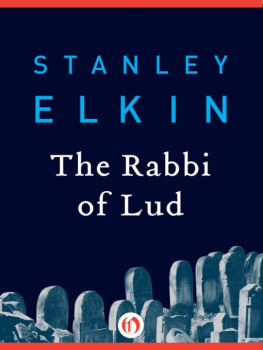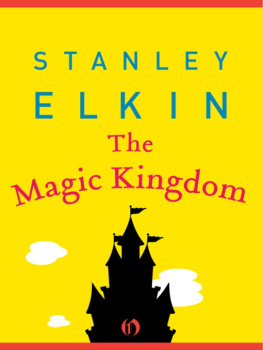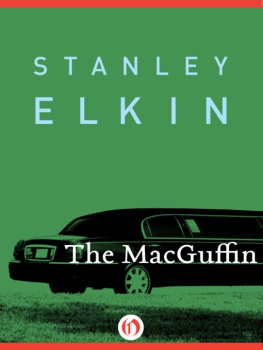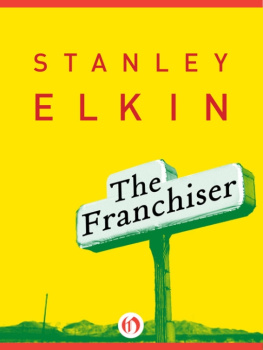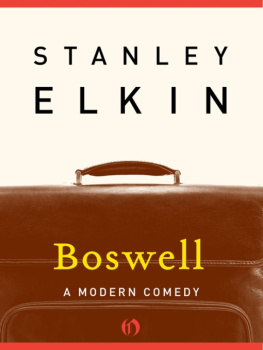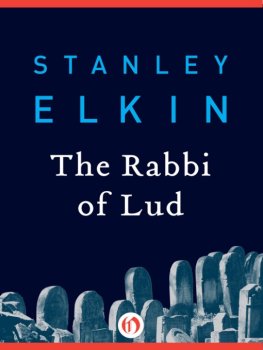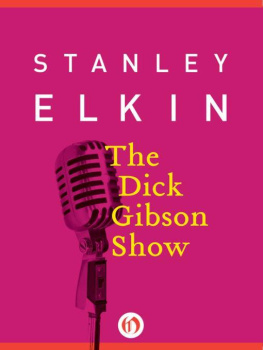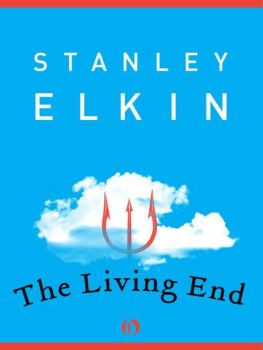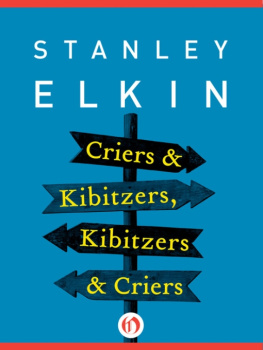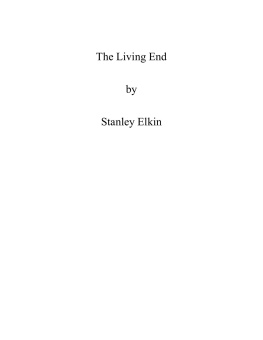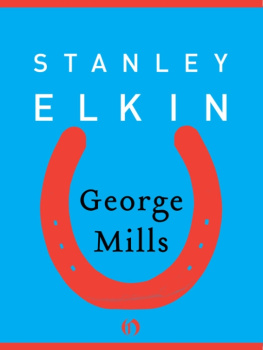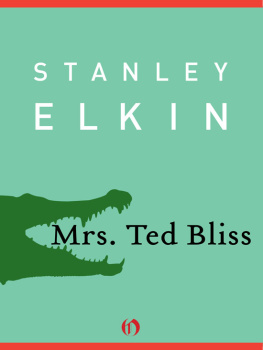Stanley Elkin - The Rabbi of Lud (American Literature (Dalkey Archive))
Here you can read online Stanley Elkin - The Rabbi of Lud (American Literature (Dalkey Archive)) full text of the book (entire story) in english for free. Download pdf and epub, get meaning, cover and reviews about this ebook. year: 2001, publisher: Dalkey Archive Press, genre: Detective and thriller. Description of the work, (preface) as well as reviews are available. Best literature library LitArk.com created for fans of good reading and offers a wide selection of genres:
Romance novel
Science fiction
Adventure
Detective
Science
History
Home and family
Prose
Art
Politics
Computer
Non-fiction
Religion
Business
Children
Humor
Choose a favorite category and find really read worthwhile books. Enjoy immersion in the world of imagination, feel the emotions of the characters or learn something new for yourself, make an fascinating discovery.
- Book:The Rabbi of Lud (American Literature (Dalkey Archive))
- Author:
- Publisher:Dalkey Archive Press
- Genre:
- Year:2001
- Rating:4 / 5
- Favourites:Add to favourites
- Your mark:
- 80
- 1
- 2
- 3
- 4
- 5
The Rabbi of Lud (American Literature (Dalkey Archive)): summary, description and annotation
We offer to read an annotation, description, summary or preface (depends on what the author of the book "The Rabbi of Lud (American Literature (Dalkey Archive))" wrote himself). If you haven't found the necessary information about the book — write in the comments, we will try to find it.
The Rabbi of Lud (American Literature (Dalkey Archive)) — read online for free the complete book (whole text) full work
Below is the text of the book, divided by pages. System saving the place of the last page read, allows you to conveniently read the book "The Rabbi of Lud (American Literature (Dalkey Archive))" online for free, without having to search again every time where you left off. Put a bookmark, and you can go to the page where you finished reading at any time.
Font size:
Interval:
Bookmark:
The Rabbi of Lud
Stanley Elkin

For Joan as always.
But for Bill Whitehead too.
The author wishes to thank Rabbi James S. Diamond and Rabbi Devorah Jacobson of the Hillel Foundation for their generous assistance whenever he asked for it. He would also like to thank Kaye Norton, Leanna Boysko and Millie Hoerner, and all the folks in the coffee room.
CONTENTS
T HEY SAY ITS FLAT as sea level and, so far as the eye can tell, it sure looks like itsome great, blunt stub of the earth, level as a table, as if the Creator had meant to mimic in dirt and pure planes of real estate the dark ascensions and black declinations of space, all His monotonous deep celestials. Heaven on earth, so to speak. Or, to hear me tell itIm Jerry Goldkorn, the Rabbi of Ludunder earth, either.
Well, this part of Jerseys not known for its mountains. The Jersey flats, they call it, that stretch between Hoboken and Newark, the upper reaches of the Garden State Parkway and the Hudson River, and though its built up now, condos and malls, industrial parks and factory outlet stores, and the skyscrapers of New York in the middle distance like another country altogether, it must once have looked like scorched earth or the kind of terrain where two opposing civilizations came to grips, just the sort of undistinguished, insignificant but bloodied parcel where the battle park goes or historic field where important papers were signed.
Which doesnt, when it comes right down, preclude. Aint it bloodied? That bunch of our dead, I mean. And at least legal if not out-and-out historical? I mean all those contracts, notarized papers, the official documents, certificates and reciprocal pledges.
Legend has itthis would have been sometime in the tenderloin of the seventeenth century, pre-Colonial times, New Amsterdam daysthat some founding Jew lost his wife and all his male and female children to one of those cyclical miniplagues that used to hit the New World from time to time. (Listen, usually the missionaries and imperialists take the rap, the troops and camp followers good for the fall. But pox is a two-way street. Disease is just as often a tradeoff. Ive got nothing against the red man per se, but all you hear about is the white guys syphilis and TB, smallpox on the blankets, typhoid in the orange juice, and other assorted germs of the paleface. Lets be frank here. The Indians dished it out pretty good themselves. There was your maize, there were your bark and berry poisonings. There was your bad peace pipe, your war-paint cosmetics and other fatal allergies. Death by the digestive and the killer contact rashes.) Forgive and forget, I say. Live and let live, why not? But the fact remains, the van Feldmaans and van Gildbergs, or whoever, came to grief along with other of their Dutch neighbors. So, sooner or later, the need arose. Say what you will, pioneers are generally rotten city planners. Many are the reasons for this, but in the case of the Jewish peoples, living on the leading edge of the Diaspora, theres usually so much else on their minds. They have to pick out a ghetto, they have to put a reliable minyan together. In a radically new environment like New Amsterdam must have been, they probably had to do a whole classification number on the flora and fauna, checking the trayf factors in the deer and the turkeys, in the catfish and tortoises, in the newfangled salads, the pumpkin pies and cranberry candies. (Im no expert in the matterI dont say I shouldnt be, I say Im notbut its a pretty good bet that those founding Jews were probably a very choosy chosen people, more Orthodox than anything we see today, if not hounded then at least closely questioned, at least scrutinized, and maybe hounded, even by their old Old World coreligionists, who would have looked on them, even in those old gabardine times, as a separate branch or sect or even cult, or otherwise why would they have bothered to make the trip in the first place? So who knows what must have been on their minds or what they would have made of all the what-have-you of the buckskin life?)
Anyway, when the sicknesswell call it New World feverbroke out and made its way under the pales and pickets and over the posts of their little Jewish stockade, and the Angel of Death took off with most of his family, the founding Jew guy was probably caught short. Not only didnt he have a family plot, there wasnt a consecrated cemetery on all Manhattan Island. What did he see? His gentile neighbors taking their particular dead off in canoes to Queens. (Because the New Amsterdam Jews were only a small contingent and were not as prepared as their Christian brothers and sisters who, outnumbering them probably a hundredfold in life, quite naturally were way ahead of them in death, too, and were already in possession of a place to bury their dead.)
Which is when, its said, someonethe name is lost to historycrossed the Hudson and discovered Ludthe vast, once and future compound of departed Jews to come. Maybe it was the treeless soil, maybe just the brown, dead look of the place, or it could be he saw a correspondence between the blank, fresh page of that open plain and the charged, historic enterprise of making something out of what wasnt just a new country this time but a new continent too.
Though the latter, Im the first to admit, is probably just the rabbi in me talking, the opportune poetry of my sacramental, laureate occasions. Im leaving a couple of things out here anywaythe mounds and the grief. Hey, Im no expert. Maybe Im thinking of a different tribe altogether. Maybe the Mounds Indians never even came East. But the subject is still savages, people buried upright or sitting in the earth like schoolchildren at their lessons, in mass graves, or left out to dry like laundry on platforms in trees. But, whatever, interfacing, impacting on a people who came from Holland by way of Poland out of Prussia and from Prussia by way of Spain out of North Africa. The whole Jew thing a wandering minstrelsy. Assimilated a dozen times before they were chewed up and spit out, covered in cultures like a snowball rolling downhill, fattening. Except that these couldnt even have been Jews as we know them, a cult, a clan, a sect, a faction, their beliefsIm a rabbi, I should know these things but here Im speculatingon the lintels of their log cabins and on their gates, and as frontlets in their beards, say, and even their skullcapsno disrespectimprovised, improbable as the headdress of the Indians themselves. But, whatever, by this time so culture-shocked out, and outraged, too, that theyhe, the founder Jew, or maybe the lookout, shotgun-riding, scout-emissary-agent Jew for himfelt strong enough about it to shove off in the old birchbark and out into the wide and whelming Hudsonthis would have been after the winter thaw, during the spring plaguesnot just to seek out Lud but to get their dead as far away from the redskin dead as possible. And from the Dutchmen dead too, all those borough-of-Queens-grounded Katrinkas and Jans, Wilhelminas and Hauke Pjeters, as if they needed to put not just one but two rivers between their different theologies, almost, I mean, as though life is one thing and its all right to walk around on the surface of the earth together without losing any sleep over it or doing any lasting damage, but death, which lasts longer, and isnt just any only make-do, temporary arrangement, is another thing entirely, and you have to do whatever you have to do in order to defend your remains against their remains.
On the grief side the ground is less shaky.
That founding Jew, the one who lost his whole family. His grief, at least, is documented.
Well, documented. I say documented, but you want to know something? Not even their names have come down to us. (Now, as you know, the whole graven-image business is a Jewish thingthe idol taboos, the no-other-gods-before-Me arrangements, all that forbidden working-model, doll-and-dummy iconography that so exercised Moses when he came down the mountain and found the Jews disporting with the golden calves.) And thats the key to itthose missing names.
Next pageFont size:
Interval:
Bookmark:
Similar books «The Rabbi of Lud (American Literature (Dalkey Archive))»
Look at similar books to The Rabbi of Lud (American Literature (Dalkey Archive)). We have selected literature similar in name and meaning in the hope of providing readers with more options to find new, interesting, not yet read works.
Discussion, reviews of the book The Rabbi of Lud (American Literature (Dalkey Archive)) and just readers' own opinions. Leave your comments, write what you think about the work, its meaning or the main characters. Specify what exactly you liked and what you didn't like, and why you think so.

